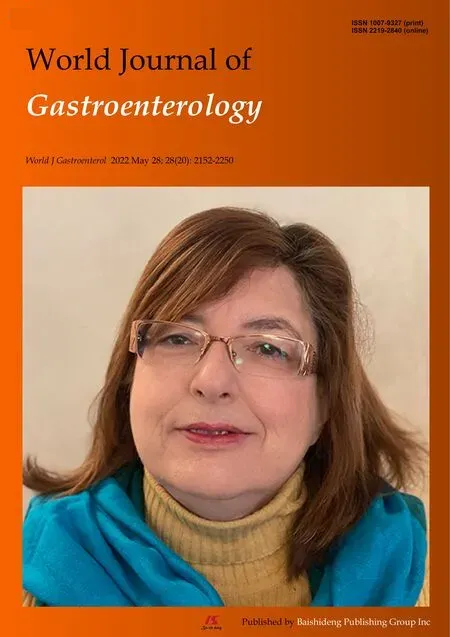Future prospect of “Gut microbiome composition can predict the response to nivolumab in advanced hepatocellular carcinoma patients”
Yong-Bo Kang, Yue Cai
Abstract Recently, we read the article “Gut microbiome composition can predict the response to nivolumab in advanced hepatocellular carcinoma patients” with interest, and it is preliminary suggested that gut microbiota is closely related to therapeutic effect of nivolumab. Based on the meaningful results of this article,several valuable research directions are proposed to enhance the therapeutic effect of immune checkpoint inhibitors on advanced hepatocellular carcinoma.
Key Words: Gut microbiome; Immunotherapy; Immune checkpoint inhibitor resistance;Probiotics; Faecal microbiota transplantation; Hepatocellular carcinoma; Prognosis
TO THE EDITOR
We read with interest the article “Gut microbiome composition can predict the response to nivolumab in advanced hepatocellular carcinoma patients”[1 ], in which the authors analyzed and summarized the correlation between gut bacterial composition and the prognosis of nivolumab therapy in hepatocellular carcinoma (HCC) patients. The highlight of this article was that gut microbiota composition and diversity of responders differed significantly from those of non-responders following nivolumab therapy. Several intestinal bacterial species such asCitrobacter freundii, Azospirillum species, andEnterococcus duranswere specific to the responders. Moreover, a higherPrevotella/Bacteroidesratio and the presence ofAkkermansia speciescan serve as predictive markers of response. Altogether, the study not only demonstrated that the therapeutic effect of nivolumab has something to do with the composition of the gut microbiota in advanced HCC patients, but also provided some inspiration for future research direction.
In our opinion, it is of importance to underline that the relationship between the therapeutic effect of various immune checkpoint inhibitors (ICIs) such as pembrolizumab, nivolumab atezolizumab,durvalumab, and avelumab on HCC and the gut microbiota. At present, the response rates to ICIs are very low in advanced HCC. To be specific, the response rate to ICI monotherapy is merely 15 %-23 %,which is increased to approximately 30 % after combination treatment[2 ]. How to improve the effectiveness of ICI treatment is essential and has been extensively investigated. While the human gut microbiota has been shown to be associated with clinical responses to ICIs in HCC[3 ], the available data in this field remain limited and the relevant scientific work is only in the initial stage. Thus, more research is required in the future. First, clinical studies with large sample sizes are needed to further clarify the relationship between the gut microbiota and the therapeutic effect of various ICIs. At the same time, which types of gut microbiota are suitable for which ICIs should also be figured out.Furthermore, construction based on the gut microbiota can function as a prognostic marker for the response to various ICI therapies. These results will provide clinicians with a valuable reference for rational use of ICIs and personalized precision therapy. Second, the mechanism by which the gut microbiota promotes the therapeutic effect of various ICIs needs to be further studied, with the focus on key pathways such as intestinal mucosal barrier function, bacterial metabolites, and microorganismrelated molecular patterns, thus being conducive to discovering how to enhance the therapeutic effect of various ICIs by targeting the gut microbiota. Third, probiotics, prebiotics, synbiotics, and antibiotics may represent innovative, safe, and low-cost strategies for promoting the therapeutic effect of various ICIs[4 ]. In this respect, it is of necessity to determine which beneficial bacteria and harmful bacteria are bound up with the therapeutic effects of which ICIs. Meanwhile, it will also be significant to confirm how probiotics, prebiotics, synbiotics, and antibiotics alter the composition of the gut microbiota and how relevant it is to the therapeutic effect of various ICIs. In other words, these results will contribute to the identification of probiotics, prebiotics, synbiotics, and antibiotics that may increase the efficacy of ICIs when being used in combination. Last but not least, faecal microbiota transplantation (FMT) may be a direct and superior approach to enhancing the therapeutic effect of various ICIs through modulating the gut microbiota in human beings. Considering that, it is extremely valuable to explore the therapeutic method of FMT in combination with ICIs. Besides, the optimal gut microbiota composition for enhancing the therapeutic effect of various ICIs should be recognized. On this basis, it is of great importance to choose the right donors[5 ].
In summary, based on the meaningful research results of this article, it is expected that readers can pay attention to the relationship between the gut microbiota and therapeutic effect of ICIs on advanced HCC and the method of regulating the gut microbiota to improve the therapeutic effect of ICIs.
FOOTNOTES
Author contributions:Kang YB and Cai Y wrote the letter and conceived the manuscript; Kang YB supervised the manuscript drafting and reviewed the literature data; and all authors contributed important intellectual content during manuscript drafting or revision.
Conflict-of-interest statement:There is no conflict to declare.
Open-Access:This article is an open-access article that was selected by an in-house editor and fully peer-reviewed by external reviewers. It is distributed in accordance with the Creative Commons Attribution NonCommercial (CC BYNC 4 .0 ) license, which permits others to distribute, remix, adapt, build upon this work non-commercially, and license their derivative works on different terms, provided the original work is properly cited and the use is noncommercial. See: https://creativecommons.org/Licenses/by-nc/4 .0 /
Country/Territory of origin:China
ORCID number:Yong-Bo Kang 0000 -0002 -1584 -5546 ; Yue Cai 0000 -0001 -6314 -0463 .
S-Editor:Wang JJ
L-Editor:Wang TQ
P-Editor:Wang JJ
 World Journal of Gastroenterology2022年20期
World Journal of Gastroenterology2022年20期
- World Journal of Gastroenterology的其它文章
- First prospective European study for the feasibility and safety of magnetically controlled capsule endoscopy in gastric mucosal abnormalities
- Digital single-operator video cholangioscopy improves endoscopic management in patients with primary sclerosing cholangitis-a retrospective observational study
- Long noncoding RNA TNFRSF10 A-AS1 promotes colorectal cancer through upregulation of HuR
- Radiomics for the detection of microvascular invasion in hepatocellular carcinoma
- Endoscopic management of intramural spontaneous duodenal hematoma: A case report
- Gadolinium-ethoxybenzyl-diethylenetriamine penta-acetic acid-enhanced magnetic resonance imaging for evaluating fibrosis regression in chronic hepatitis C patients after direct-acting antiviral
